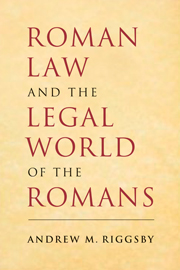Book contents
- Frontmatter
- Contents
- ROMAN LAW AND THE LEGAL WORLD OF THE ROMANS
- 1 Introduction
- 2 Roman History – The Brief Version
- 3 Sources of Roman Law
- 4 Sources for Roman Law
- 5 The Legal Professions
- 6 Legal Education
- 7 Social Control
- 8 Legal (In)equality
- 9 Writing and the Law
- 10 Status
- 11 Civil Procedure
- 12 Contracts
- 13 Ownership and Possession
- 14 Other Rights over Property
- 15 Inheritance
- 16 Women and Property
- 17 Family Law
- 18 Delict
- 19 Crimes and Punishments
- 20 Religious Law
- 21 Law in the Provinces
- 22 Conclusion
- Documents
- Glossary
- Further Reading
- Index
5 - The Legal Professions
Published online by Cambridge University Press: 05 June 2012
- Frontmatter
- Contents
- ROMAN LAW AND THE LEGAL WORLD OF THE ROMANS
- 1 Introduction
- 2 Roman History – The Brief Version
- 3 Sources of Roman Law
- 4 Sources for Roman Law
- 5 The Legal Professions
- 6 Legal Education
- 7 Social Control
- 8 Legal (In)equality
- 9 Writing and the Law
- 10 Status
- 11 Civil Procedure
- 12 Contracts
- 13 Ownership and Possession
- 14 Other Rights over Property
- 15 Inheritance
- 16 Women and Property
- 17 Family Law
- 18 Delict
- 19 Crimes and Punishments
- 20 Religious Law
- 21 Law in the Provinces
- 22 Conclusion
- Documents
- Glossary
- Further Reading
- Index
Summary
A roman facing a legal problem might be assisted by two different kinds of professionals (or, if not literally professionals, at least experts): an advocate, whose training and experience were primarily in public speaking, and a “jurist,” whose role was primarily in interpreting and explaining the law. The first section will sketch out the differences between the two (which changed somewhat over time). The second will discuss ways in which the two remained somewhat connected to each other. The last briefly treats a few other types of legal workers.
THE TWO PROFESSIONS
Aquilius Gallus, a legal expert of the mid first century bc, made himself available to answer legal questions from strangers. When asked about handling questions of fact that arose in particular cases, he is said to have answered: “That is not a question for the law; it is a question for Cicero.” While he framed the matter as a difference between persons (himself and Cicero), it is generally believed that he was pointing to a more general distinction between (to use the English terms) “jurists” and “advocates.”
In Latin, jurists could be referred to by a number of different phrases meaning roughly “expert in law.” According to a comment of Cicero's elsewhere, these experts made themselves useful through pleading, consulting (as Aquilius did with his visitors), and legal drafting. Pleading in court seems to have fallen away over time (though this can be disputed), but advice and even providing evidence in individual cases continued.
- Type
- Chapter
- Information
- Roman Law and the Legal World of the Romans , pp. 47 - 56Publisher: Cambridge University PressPrint publication year: 2010

